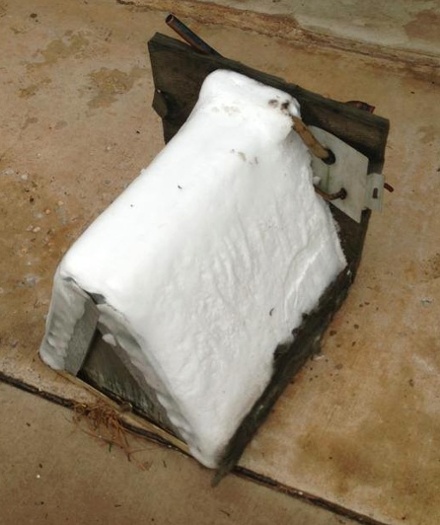Sign #1: You hear running water
If you hear running water and you don’t know where it’s coming from, it’s probably the toilet. (Of course, you should be absolutely sure that all faucets, showers, and outside water hoses/sprinklers are turned off.) This type of toilet problem can lead to a significant waste of water.
https://boulden-brothers.wistia.com/medias/13io2ff6pp?embedType=async&videoFoam=true&videoWidth=640
The underlying issue could be the flapper, flush lever assembly, fill valve, or the tank ball. These components are all located inside the tank at the top of the toilet. You can easily check them by removing the lid from the tank. Be especially careful with older toilets because the lid can become fragile over time. Some newer flush valves may look different from what you’re expecting. For the most part, though, the components of a toilet haven’t changed much over the years.
Sign #2: It takes multiple flushes
If you have to flush more than once to clear the toilet, that means that not enough water is traveling through the system. This could be caused by a blockage in the drain. It could also be a restriction or clogging of the small holes under the toilet rim. Iron or hard water will cause these holes to gradually accumulate buildup. The buildup will result in less water coming out every time you flush. It’s not really a matter of keeping the toilet rim clean, either. The buildup will occur in the small channels in the inside of the toilet regardless of how clean the toilet is.
Sign #3: Water is seeping under the toilet
Water seepage underneath the toilet is an indicator that the wax ring has failed. This type of problem won’t usually lead to a major leak. However, the liquid seeping from underneath the toilet is unsanitary. The problem should be addressed by a qualified professional as soon as possible.
What if an old toilet seems to have a weak flush?
People have become accustomed to the greater flushing power of newer toilets. You may have an old toilet that works perfectly fine, but it was never designed to have the flushing power of a newer toilet. Whenever the time comes for a replacement, we will install a new toilet that meets the current code. These toilets do a great job of flushing effectively while also conserving water.
Can you make the problem worse?
It’s not likely, but it is possible. The issue will probably just cause a lot of aggravation. After making multiple trips to the hardware store you may still be unsuccessful. If you’re extremely careless, you may cause additional damage. The bottom line is, it’s a good idea to contact a qualified professional if you have any doubts. You’ll probably end up saving yourself a headache.
If you’ve spotted one of the three common signs that something’s wrong with your toilet, give us a call today or contact us online so we can get it fixed.
 It doesn’t matter if you’re using a portable tank or a full-size home tank, propane tanks have the same basic components (they only change in complexity as the tank gets bigger). Whether you’re firing up the grill in your backyard or simply turning on a gas-powered appliance inside your home, every proud propane proprietor will eventually hear strange sounds coming from the appliance, the gas line, or the tank itself. An odd noise is usually a sign of a problem so we recommend keeping an eye out for these noises for both your safety and to protect the lifespan of your equipment.
It doesn’t matter if you’re using a portable tank or a full-size home tank, propane tanks have the same basic components (they only change in complexity as the tank gets bigger). Whether you’re firing up the grill in your backyard or simply turning on a gas-powered appliance inside your home, every proud propane proprietor will eventually hear strange sounds coming from the appliance, the gas line, or the tank itself. An odd noise is usually a sign of a problem so we recommend keeping an eye out for these noises for both your safety and to protect the lifespan of your equipment.  Central heating and air has one very specific job: Adjust the temperature of your home to a more comfortable level. Unfortunately, HVAC systems do this by moving and regulating airflow throughout a home. If any portion of that system develops a strong smell you’ll find that same smell filling every room in your house very shortly. Just as some smells aren’t as bad as others, some problems that cause smells aren’t as terrible as others. In fact, you can identify some HVAC problems by the smells they cause so you can identify who you need to contact for help.
Central heating and air has one very specific job: Adjust the temperature of your home to a more comfortable level. Unfortunately, HVAC systems do this by moving and regulating airflow throughout a home. If any portion of that system develops a strong smell you’ll find that same smell filling every room in your house very shortly. Just as some smells aren’t as bad as others, some problems that cause smells aren’t as terrible as others. In fact, you can identify some HVAC problems by the smells they cause so you can identify who you need to contact for help.  Whether you’re in a brand new house or enjoying your home’s jubilee year, there are probably a few minor repairs or electrical issues needing attention. Some problems will need a professional, while others can be addressed by anyone with a screwdriver and some attention to detail. Even electrical work has a few home-wiring quick fixes that are safe and simple to follow. Quick fixes like this can not only save you on costly repairs, but they’ll also help you to identify any further problems that do require professional assistance.
Whether you’re in a brand new house or enjoying your home’s jubilee year, there are probably a few minor repairs or electrical issues needing attention. Some problems will need a professional, while others can be addressed by anyone with a screwdriver and some attention to detail. Even electrical work has a few home-wiring quick fixes that are safe and simple to follow. Quick fixes like this can not only save you on costly repairs, but they’ll also help you to identify any further problems that do require professional assistance. 
